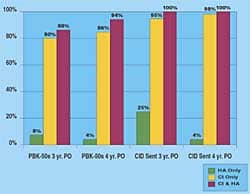University of Adelaide researchers have started work on developing a new vaccine that could help ward off painful ear infections in children.
The potential vaccine is in the initial stages of development in the lab and will target one of the main types of bacteria that cause middle ear infections, a common illness among infants and young children.
“Ear infections are commonly caused by bacteria known as non-typeable Haemophilus influenzae and these infections can have devastating outcomes, such as hearing loss in children,” says Erin Brazel, PhD, from the University of Adelaide’s Research Centre for Infectious Diseases.
More than 80% of children will experience a middle ear infection by the time they are three years old.
Symptoms typically include pain and pressure in the ear, but persistent cases can have long-lasting effects, including hearing loss and developmental delays.
Developing the Ear Infection Vaccine
“An effective vaccine would drastically reduce cases of ear infections among children. This would be incredibly beneficial for Indigenous communities where there are high rates of middle ear infections caused by this type of bacteria,” says Brazel.
University of Adelaide researchers are working collaboratively with South Australian biotech company GPN Vaccines on the project. The team has previously worked together to develop a new universal pneumococcal vaccine, which is currently in clinical trials.
Further reading: New Technique to Treat Middle Ear Infections Developed
“Non-typeable Haemophilus influenzae are incredibly diverse bacteria. This has complicated vaccine development as their surface proteins vary significantly from strain to strain. We aim to use a similar whole-cell vaccine approach as we have taken for our pneumococcal vaccine. This strategy introduces the full array of surface proteins to work effectively against multiple strains,” says Brazel.
The project has recently received funding through the National Industry PhD program, which will support University of Adelaide PhD student Carla Gallasch, as she continues to work on the development of a new vaccine.
“I’m incredibly grateful for the opportunity to work on a project that addresses a burgeoning yet under-appreciated global health risk. It’s very special to be immersed in an industry-focused program under the outstanding mentorship of the GPN team,” says Gallasch, who is also a researcher with the University of Adelaide’s School of Biological Sciences.
Professor Tim Hirst is the CEO for GPN Vaccines.
“I’m thrilled Carla Gallasch and the joint GPN-University of Adelaide project has been selected as one of the first recipients of the National Industry PhD program. I very much look forward to supporting Carla in her PhD as she seeks to create a new vaccine that will reduce the global burden of disease, especially in young children,” Hirst says.
Researchers believe an ear infection vaccine could also be used to target lung infections in adults that are caused by the same bacteria.
The project is currently at an early stage, but researchers hope to commence human trials in the next three years.
Featured image: (from left to right) University of Adelaide’s Dr Erin Brazel and Carla Gallasch. Photo: University of Adelaide




